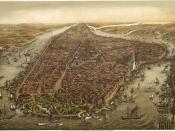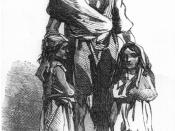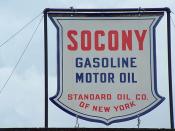Unacknowledged HeroesThe discovery of oil in Pennsylvania in the mid 19th century immediately started the growth of a new industry. Its use as a producer of kerosene for lighting created began the overwhelming demand for oil. By the time John D. Rockerfeller was able to monopolize the oil industry into the Standard Oil Company, it had already become a necessity in America's society. Oil has been essential in fueling transportation vehicles and power stations, and is vital in the development of plastics, tars, and tires worldwide (Uses).
Though many Americans heavily rely on oil in their daily routines, few fail to neither consider nor acknowledge the people responsible for its development. Most of the people accountable for birthing the world's oil industry previously poured in with large waves of immigrants (Reid). Those of Irish descent greatly outnumbered all other nationalities in the mid eighteen hundreds during the peak of immigration (Irish).
This overwhelming number of Irishmen in desperate need of jobs caused them to further migrate to different parts of America. This shift did not grant all Irish immigrants the success they wished for, like that of "Leadville Johnny" Brown in the 1849 Gold Rush or John Daniel Crimmins, whose construction company built much of New York City in the 1800's (Making). Yet most families were perfectly content with the successes they created, and positively developed their lives greatly in comparison to previous lifestyles.
Newlyweds Michael and Bridget Reid were eager to begin their lives together in 1855. Both had been raised in Tipperary, Ireland (Reid) and had lived through many of its hardships. As teenagers they experienced the Great Potato Famine when it struck Ireland, which destroyed more than half of the nation's staple crop and caused over one million people to die of starvation and disease (Irish Potato). As a result, between 1845 and 1855, millions of Irish natives fled to North America due to lack of food, which in turn led to the decline of economic conditions and chaos in Ireland (Your Irish). Though the majority of immigration in the 1800's took place during the famine, Michael and Bridget were slightly delayed in their decision to immigrate to the United States. This may not have been in their control, considering many immigrating families had to save up enough money to emigrate due to poverty levels (Irish in America). Therefore, it is a definite possibility that Michael and Bridget did just that. Yet once their first and second sons William and Thomas were born in 1857 and 1859, Michael and Bridget knew they needed to ensure that their children's lives would be prosperous (Reid).
During the late 19th century, millions of immigrants poured into America to pursue their dreams in the country that promised prosperity and easy-living for all. The young Irish couple Michael and Bridget had caught wind of the sweet possibilities that America had to offer, and decided that moving there would be favorable for their family. However, the poverty that struck the families of Ireland so drastically impaired Michael and Bridget from proceeding with their plan. In order for them to establish their family in America, their son William was kept with an uncle in Ireland until they could be sent for a few years later when they had again saved enough money (Reid).
They arrived in Manhattan, New York around 1860 expecting to step onto sidewalks paved with gold since previous friends and family had gossiped about the splendors America contained (Reid). Contrary to the visions they imagined of New York, Michael and Bridget walked onto roads of filth, lined with sewage and garbage. The housing the family was forced to live in was nothing more than a crowded back room of a dilapidated building (Reid). The stench of the city was unbearable, and the death rate was astonishingly high. The Irish had been discriminated against in America at this time, especially in cities (Reid). Michael had been a successful cooper in Ireland, creating barrels for food and other storage needs. Yet New York City did not prove to have adequate job opportunities in his trade to properly care for his family. Most employers were not looking for skilled laborers, but for unskilled people that could be paid for very little for hard physical labor (America). While living in Manhattan, Michael and Bridget had three more children: John in 1862, Michael in 1864, and Mary in 1867. Yet the physically unhealthy and discriminatory conditions became unbearable, especially while trying to provide for five children. Therefore, the family decided to relocate to Pennsylvania in the midst of the Oil Rush in 1869 in hopes of developing and more successful and healthy lifestyle for their family (Reid).
The family arrived in Petroleum Center, Pennsylvania in 1869, where the oil business was booming. Michael immediately landed a job because of his skilled craft as a barrel cooper. Though pipelines were in existence at this time, Petroleum Center alone consisted of over 1,200 oil-producing wells. Therefore, barrels were still needed to store and transport oil (Reid). Bridget also found her calling in Pennsylvania by using her education received in Ireland to teach others less fortunate than her (Reid). In these respects, Michael and Bridget were prosperous and were finally able to better provide for their children born previous to moving to Pennsylvania, as well as their two new additions James and Catherine, who were born in 1870 and 1872. In 1873, the family was able to purchase their first home on the border of Oil City for a small price while the city was still being developed (Reid). Yet the town developed more rapidly than the family could have ever imaged, with the population reaching over 10,000 by 1870 (Reid).
In the latter end of the 19th century, the oil business was thriving, and much of the Reid Family was becoming a part of it. Among the children of Michael and Bridget, William, Thomas, John, and James all became involved in the prosperity of the oil industry. The four brothers were employed in Vacuum Oil Company, which emerged from the original oil boom, in 1866 (Reid). Two of these brothers decided to pursue their careers in the Vacuum Oil Company in Rochester, New York in 1890 due to the expansion of the company in a more urban area (Reid). During their time as employees, the Standard Oil of New York (also known as Socony) eventually bought out Vacuum Oil in 1931, which was then renamed Socony-Vacuum Corp (Reid). Through all of the changes made to the company, the Reid brothers remained loyal employees. However, when this large enterprise finally became Mobil Oil Company in 1955, the Reid Family seemingly stopped their employment with the company due to the fact that there is no documentation proving otherwise.
It has puzzled the descendents of the Reid Family as to why they decided to discontinue their service, and is still unknown to this day, especially since the oil business had been prosperous since the oil rush. One hypothesis is that the men's skilled labors as barrel makers was no longer needed, and were laid off. However, one would think that the pipelines would have made the need for coopers obsolete long before the middle of the 20th century. Therefore, this is unlikely. Another notion is the name change from Socony to Mobil Oil may have changed terms of the company that the family did not agree upon. Yet, the probability that all family members being so strongly opinionated about these changes that they quit their sound jobs is small. An additional thought is those hired through the Socony Vacuum Industry were not in the contract when it developed into Mobil Oil Company. This is plausible due to the fact that all of the Reid Family that was previously employed in numerous cities suddenly was no longer involved.
Considering all of the information gathered and the circumstances of my family members, I have come to my own conclusion on why the Reid Family is no longer affiliated with the oil business. By the time Standard Oil became Vacuum Oil in 1931, all but one of the sons of Michael and Bridget Reid had already been deceased, and James Reid was the only son still employed. Yet 1931 was only five years prior to his death, therefore he was probably retired from the company. Therefore, it is just irony that the Reid Family was no longer associated at the time Socony Vacuum Industry became Mobil Oil Company.
Michael and Bridget Reid and the successors of their family had a great deal to do with the development of what Mobil Oil Company have come to be. Presently, Mobil Oil Company is continually on the climb in the oil industry and has become a huge influence on the international market, with the title as the "world's largest publicly traded international oil and gas company" (ExxonMobil). However, this business would not thrive as it does today without the original people who initiated the industry; those people that were determined to seek success for the betterment of themselves and their families.
Immigrants were not well liked by many Americans in the mid-late 1800's. Yet many of these immigrants labored long hours necessary to create the success that the oil business has reached. The Reid Family never gave up the challenge of finding what opportunities in America best suited them. Michael Reid possessed the craft of coopering needed in the oil industry at the time, and was able to pass down this skill to his children who became coopers as well (Reid). The immediate family of Michael and Bridget was very involved in the oil business and contributed to its vast amount of prosperity. The Reid Family continued it's involvement in the oil industry for almost 100 years, guaranteeing that they had somewhat of a significant impact on the company. However, it may be more important to look at the opposite end of the spectrum as to "who benefit who" in this situation. The oil rush in the middle of the 19th century gave the Reid Family more opportunity than they could have imagined. Even though they had a significantly rough start when they first encountered the slums of Manhattan, it was lucky they were able to become involved in a flourishing industry. The oil rush of Pennsylvania not only gave employment to Michael Reid, but opened doors of opportunity for his children and other Irish immigrants that also came to America at a time when prosperous employment was unlikely for many Irish families. The spread of the company also allowed the Reid employees to travel to different cities, such as Rocheseter, New York, where much of my family lives today. The lively and successful city of Rochester permitted the Reids to find successful jobs in the oil industry, and sustained new generations of Reids in other respectable employment fields thereafter. Without the bravery and persistence of Michael and Bridget Reid to find success in the United States, both the Reid Family and the oil industry would not be in the prosperous condition they are presently. The Reid Family would not have found all of the many opportunities that Rochester New York had to offer; and the United States would not have such a definitive (yet quickly depleting) material for manufactured products nor a vital source of energy.
Works Cited"ExxonMobil: About Us." 2007. Exxon Mobil Corporation. 22 Oct. 2007 .
"Irish Immigration History." Your Irish: Life Through Irish Eyes. 2007. 21 Oct. 2007 .
"Irish in America: Losing Their Identity." United States Naval Academy. 21 Oct. 2007 .
"Irish Potato Famine." Encyclopædia Britannica. 2007. Encyclopædia Britannica Online. 23 Oct. 2007 .
Reid, Dave E. Reid Family Tree. 2004.
"The Making of a Melting Pot: Irish Immigration to America From 1700 to the Early 1800s." Immigration Daily. The American Immigration Law Foundation. 28 Oct. 2007 .
"The Uses of Oil Through the Ages." OIL AND GAS - ENERGY FOR THE WORLD. Institute of Petroleum. 30 Oct. 2007 .





